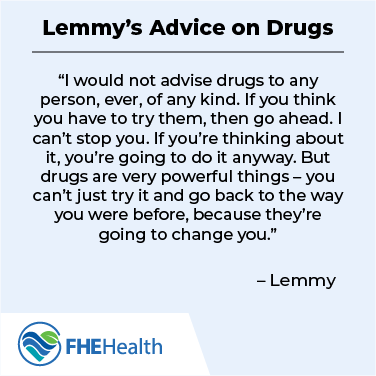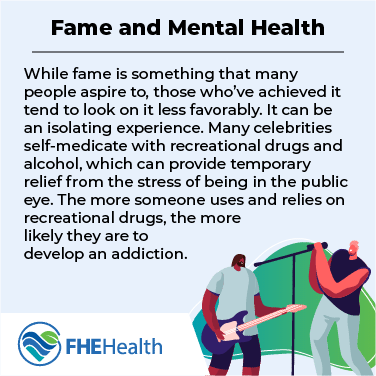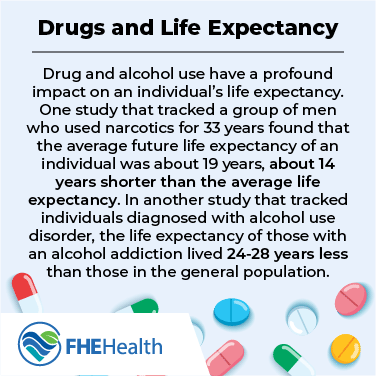
Ian Fraser Kilmister, better known as Lemmy, was an English musician that was the founder, bassist, lead singer and main songwriter for the rock band Motorhead. His gravelly voice has been named as one of the most recognizable in rock, and many musicians look to him as an icon.
Lemmy was born in Stoke-on-Trent, a large city in Staffordshire, England, in 1945. He lived primarily with his mother and grandmother until his mom married former rugby player George L. Willis when Lemmy was 10. Around that time, his family moved to the Welsh village of Benllech, where he attended school at Ysgol Syr Thomas Jones. It’s rumored that he earned his moniker there for regularly asking, “Lemmy (lend me) a quid ‘til Friday,” so he could play slot machines. It was also around this time that he first picked up the guitar.
Lemmy’s career began in 1960 when he joined a couple local bands and played clubs for several years. In 1971, he joined Hawkwind, a move that he was talked in to by a bandmate who wanted to have another person in the band who used amphetamine, or speed. He played with the band for years before he was asked to leave after a drug-related arrest.
After leaving Hawkwind, he formed a new band called Motorhead, which was named for the last song he wrote for Hawkwind. The band went on to have several chart-topping hits and became one of the most influential bands in the heavy metal genre.
View this post on Instagram
Lemmy’s History with Substance Use
 Throughout his career, Lemmy was open regarding his regular use of recreational drugs, particularly speed. His use was so widely known that in the United Kingdom, someone who did a lot of speed was called a motorhead. He also smoked and drank excessively.
Throughout his career, Lemmy was open regarding his regular use of recreational drugs, particularly speed. His use was so widely known that in the United Kingdom, someone who did a lot of speed was called a motorhead. He also smoked and drank excessively.
With all the drugs Lemmy did, there was one that he stayed away from: heroin. In his autobiography White Line Fever, Lemmy wrote about his experiences with heroin, saying, “It was around this time that I learned to hate heroin. It started to be a real problem around 1970… It always looked like misery to me. No fun at all.”
When asked about what advise he would give someone regarding drugs, Lemmy had this to say: “I would not advise drugs to any person, ever, of any kind. If you think you have to try them, then go ahead. I can’t stop you. If you’re thinking about it, you’re going to do it anyway. But drugs are very powerful things – you can’t just try it and go back to the way you were before, because they’re going to change you. Sometimes for the better, sometimes for the worse. Mostly for the worse. If you’re sticking needles in yourself, then that’s very bad news. Even with my famous rep, not once. Never ever.”
Fame and Mental Health Problems
 Addiction and mental illness aren’t discriminatory. While the public perception of celebrities is that they’re slightly better, more sophisticated versions of the average person, the truth is that they’re just as likely to develop addictions or mental illnesses. In some cases, fame can contribute to illnesses such as depression.
Addiction and mental illness aren’t discriminatory. While the public perception of celebrities is that they’re slightly better, more sophisticated versions of the average person, the truth is that they’re just as likely to develop addictions or mental illnesses. In some cases, fame can contribute to illnesses such as depression.
While fame is something that many people aspire to, those who’ve achieved it tend to look on it less favorably. It can be an isolating experience for those who’ve achieved stardom when they don’t feel ownership of their own lives, don’t know who to trust and lose their connections with friends and family. Many celebrities self-medicate with recreational drugs and alcohol, which can provide temporary relief from the stress of being in the public eye. Unfortunately, the comfort that substance use provides is short-lived, driving many to use again. The more someone uses and relies on recreational drugs, the more likely they are to develop an addiction.
Lemmy’s Health Late in Life
In the last years of his life, Lemmy’s health began to deteriorate. When performing in Wacken, Germany, in 2013, he had to cut his show short. By that time, he was living with Type 2 diabetes, relied on a defibrillator and had been fitted for a pacemaker. Some lifestyle changes were in order, so Lemmy cut back from two cigarette packs per day to one. After 40 years of drinking a half-gallon of Jack Daniels daily, he switched to vodka and orange juice and had no more than five daily drinks. He still took speed every day.
While little is published about his mental health throughout his life, towards the end, he lived with depression. This was due to his own health issues along with drug-related deaths of many of his friends. In 2015, his speech began to deteriorate and friends were concerned that he suffered a stroke. He went in for an X-ray, which revealed that he had cancer. Within days or his diagnosis and just four days after his 70th birthday, Lemmy passed away. Officially, Lemmy’s cause of death was prostate cancer, cardiac arrhythmia and congestive heart failure.
Following in Lemmy’s Footsteps
Lemmy has been held up as a rock and roll icon, setting the expectation of what the life of a musician looks like. The creativity, talent and dedication he displayed are admirable, and he set the scene for British heavy metal and thrash metal. Some of the world’s leading musicians, including Ozzy Osborne, Dave Grohl and Brian May cite him as their inspiration.
Unfortunately, Lemmy’s excessive drug and alcohol use complicate his legacy. While he demonstrated outstanding commitment to his career, his drug and alcohol use negatively impacted virtually every other area of his life. Those who would emulate him may risk following his self-destructive patterns.
Did Drug Use Affect Lemmy’s Duration or Quality of Life?
 Famous or not, drug and alcohol use have a profound impact on an individual’s life expectancy. One study that tracked a group of men who use narcotics for 33 years found that the average future life expectancy of an individual was about 19 years, about 14 years shorter than the life expectancy of a male from the general population who doesn’t use narcotics. Similarly, in a population-based register study that tracked individuals diagnosed with alcohol use disorder, the life expectancy of those with an alcohol addiction lived 24-28 years less than those in the general population.
Famous or not, drug and alcohol use have a profound impact on an individual’s life expectancy. One study that tracked a group of men who use narcotics for 33 years found that the average future life expectancy of an individual was about 19 years, about 14 years shorter than the life expectancy of a male from the general population who doesn’t use narcotics. Similarly, in a population-based register study that tracked individuals diagnosed with alcohol use disorder, the life expectancy of those with an alcohol addiction lived 24-28 years less than those in the general population.
Along with negatively impacting an individual’s life expectancy, addiction takes a toll on their quality of life. One peer-reviewed study observed that active addiction affects virtually every area of a person’s life, from their relationships with family and friends and their access to stable housing and health services to their physical and mental health. When researchers inquired about individuals’ reasons for seeking treatment for alcoholism, they noted the significant number of problems these people experienced due to their addiction.
Despite Lemmy’s excessive substance use, he lived to be 70 years old, double the average life expectancy of 35 years for European musicians. While his drug use didn’t appear to have a significant impact on the duration of his life, it undoubtedly negatively affected his quality of life. Plenty of stories are in circulation of how he avoided relationships and sabotaged those that he did build. Amphetamine psychosis is a well-known condition that often accompanies long-term use of speed, which would have severely impacted mental health. Physically, substances such as alcohol and speed put a lot of strain on the body, impacting its ability to heal from injuries and illnesses and function properly.
Lemmy died of cancer at 70 years old, about seven years shy of the average life span of a U.S. resident and about 10 years under the life expectancy in the United Kingdom. It’s impossible to know whether he would have been able to beat cancer or even if he would have developed the disease if he’d had a healthier lifestyle.






